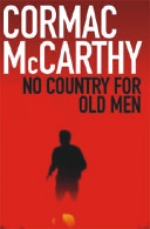|
Book Review
Gunning for trouble
Annie Proulx
 |
No Country for Old
Cormac McCarthy |
Cormac McCarthy has chosen one of the most interesting Texas figures as the central character in No Country for Old Men - the county sheriff. The old Texas sheriffs served as law men, psychiatrists, Mr Fixits, social workers, medical aides and lonely hearts advisers. McCarthy's sheriff, Ed Tom Bell, a happily married, decorated second world war veteran, is respectful of life, and, like nature writer Barry Lopez, stops his vehicle and removes crushed animals from the roadway to the grassy verge. He has a sense of humour so dry it is almost incendiary. He cares enormously about the people in his county and decided to become a law officer almost as a monastic choice to atone for something that happened during the war. He speaks in the purest Texan with the idiosyncratic quirk of saying "kindly" instead of "kind of". The dialogue is perfect. No one has McCarthy's ear for regional talk, nor eye for details of place. The writing transforms a standard western good-guy-bad-guy plot into serious literature.
The time is 1980 and the situation circles around another happily married man, Llewelyn Moss, a Vietnam veteran and welder who lives in the county and so comes under the sheriff's umbrella. While out hunting, Moss comes upon three vehicles, big trucks and SUVs, surrounded by dead men. In one of the vehicles there is a Mexican man who is not quite dead, and who begs for water which Moss doesn't have. The truck is packed with drugs. He follows a blood trail to another dead man who has beside him a leather satchel full of a great deal of money. Moss takes the satchel. Back home he wakes in the night with a sense of urgency, fills a jug with water and returns to the truck. This humanitarian gesture lets loose the demons.
The malevolent, bird-shooting villain is a prime psychotic sociopath named Chigurh, the embodiment of the drug world and the new kind of killer that is reshaping not only Bell's county, but the whole nation. Several evil parties, including Chirgurh, are after Moss; the sheriff, after a young deputy is done in by Chirgurh, is after them. Soon enough the trails of the deputy-killer and the Moss-hunter intersect. The corpses pile up. Sheriff Bell knows he is standing against terrible and alien killers who increasingly seem to him to presage the dissolution of decent American life: the symptoms of a ghastly disease ravaging an increasingly godless and heartless nation. These inhuman psychopaths are not the kind of criminals the sheriff understands, and he begins to fill with a painful Weltschmertz
There are a lot of guns in this story. If you are going to set a novel in the most gun-loving state of a gun-loving country, let us have them in detail. Few writers know enough about firearms to write about them convincingly and broadly. McCarthy has either steeped himself in gun lore or is familiar with them from use; they greatly add to the deadly miasma the sheriff sees rising up around him. The arms include a nickel-plated government .45 automatic, a nine millimetre parabellum, a pistol with a hairspray-can silencer, a stun gun (for unlocking doors), an Uzi, a stainless steel .357 revolver, a Tec-9 semiautomatic, a 12-gauge shotgun, a .30 calibre machine-gun and a rifle. (Bell would not like to know that there is a cell phone/stun gun on the market today.) The firearm minutiae informs McCarthy's reeking world of motels and highways.
After a while the sheriff provokes a little thought. The reader, oppressed by his long italicised monologues, longs to say: "Suck it up, Bell. The world is changing. The nights are hot. There are too many people, too many advertisements that make everyone crazy for expensive junk, that pump up egos and the sense of a right to gratification. There is too much money lying around in satchels." The sheriff does not answer back. He has his own personal guilt and finally confesses to his aged uncle that during the war he, Bell, left his unit's position after it was blown to hell by a German mortar shell. Bell, after firing at the Germans for some time, left under cover of night and rain, and for decades has told himself that he had abandoned his wounded and groaning comrades.
The book inspires discussion and reading groups will surely have vigorous responses to it, not the least of which is the question of why McCarthy set this story in 1980. Is it because this is the year when Ronald Reagan, after a blitzkrieg television ad campaign, ousted Jimmy Carter and the Republicans gained control of the Senate for the first time in almost 30 years? Or because the New Mexico penitentiary riots, the murders of Atlanta black children, the shootings of John Lennon, Dr Herman Tarnower, ex-congressman Allard Lowenstein, physician-author Michael Halberstam and many others, as well as the US Coast Guard's firing on a marijuana-laden fishing boat off the Florida coast, all made headlines indicating a violent country flaming out of control? McCarthy's oeuvre can be seen as the ongoing study of a burning American rage, and how common that rage has become.
Source: The Guardian
Copyright
(R) thedailystar.net 2005
|
